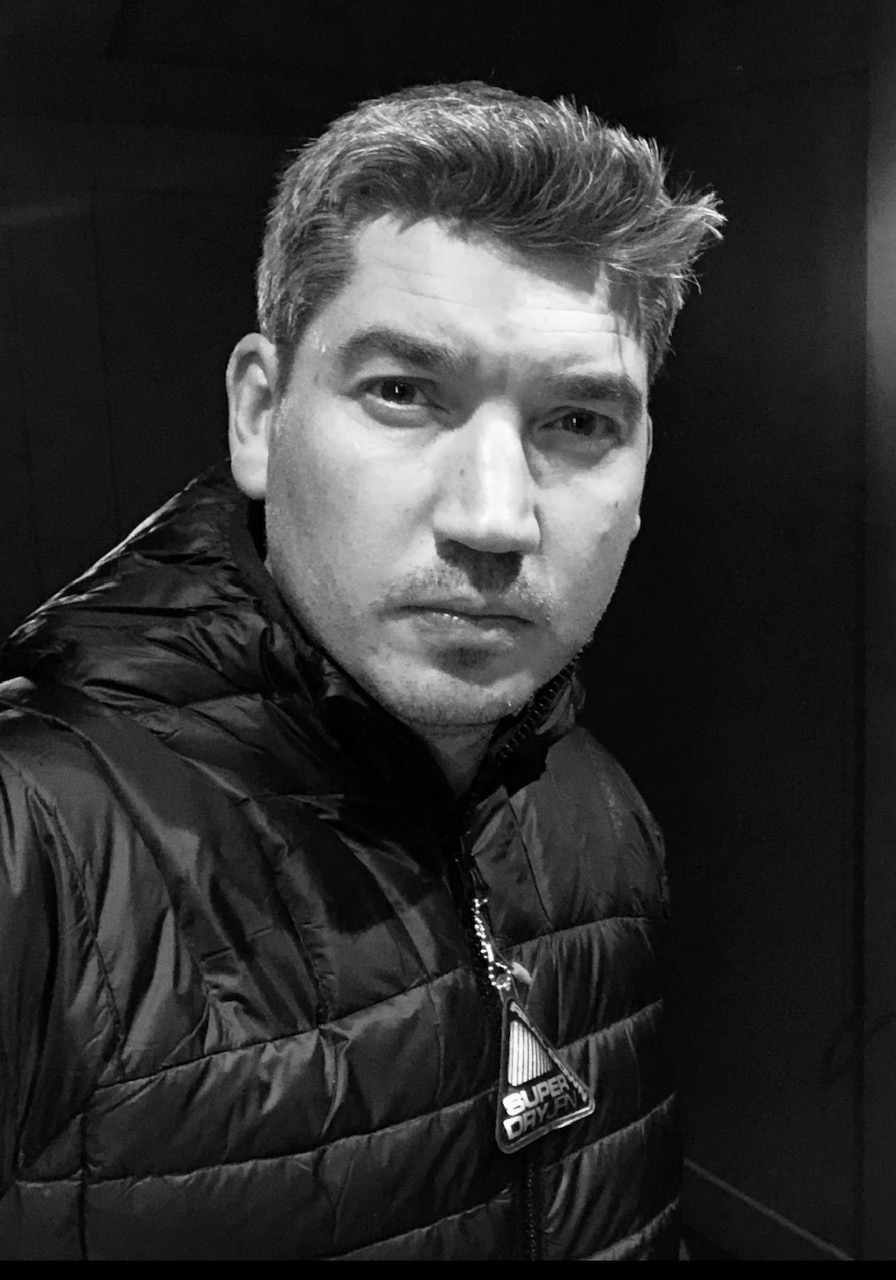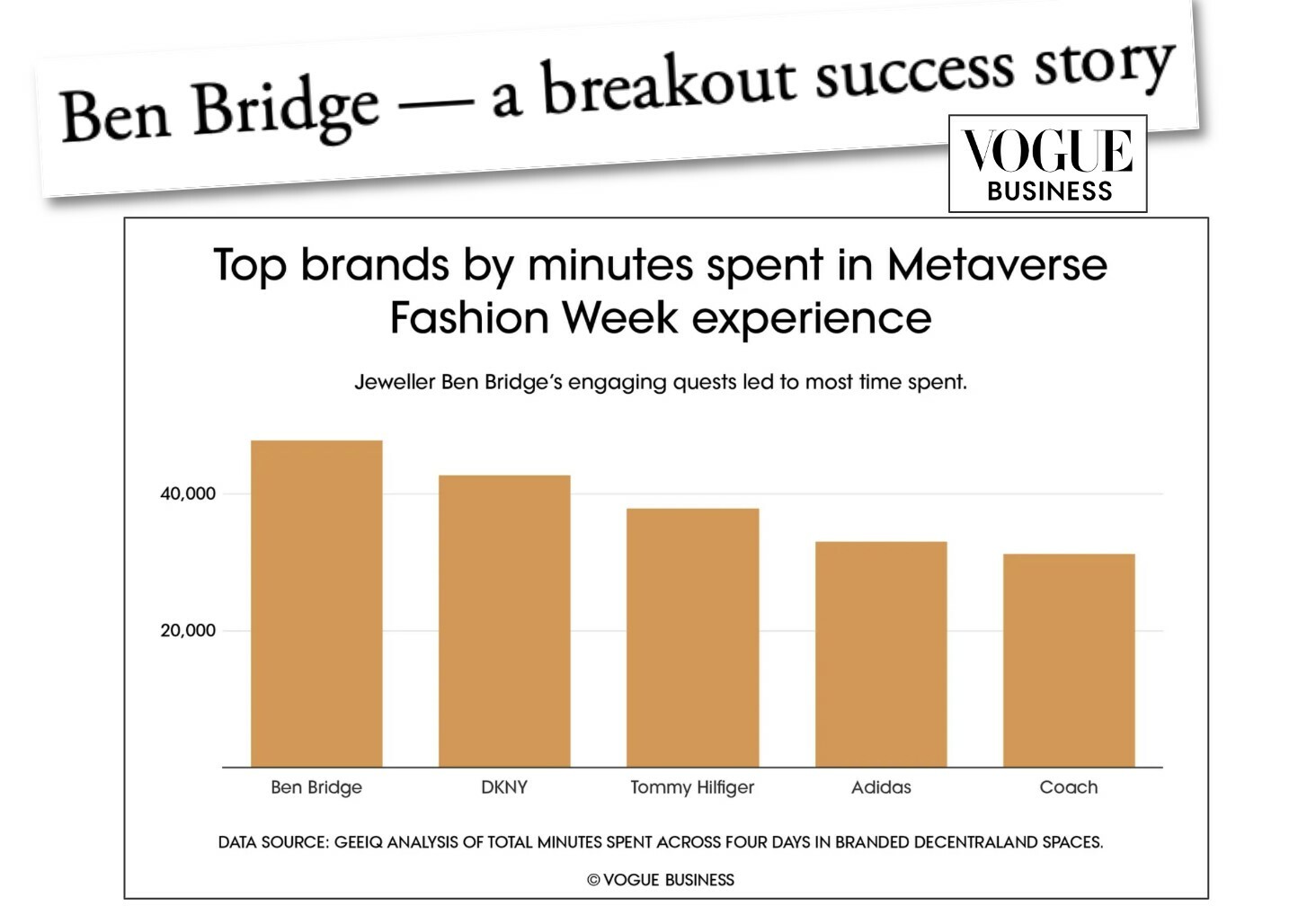Fundamental rules of brand-to-customer relations seem to shift drastically in the digital paradigm.
During Metaverse Fashion Week 2023, interactivity and immersion in digital experiences appeared as key factors in brand-customer relationships. People that have connected to the MVFW were seeking to be entertained and to establish a unique and individual relationship with the brand they appreciate.
If there is one brand that truly understood what the new rules are is Ben Bridge. According to GEEIQ, users spent a total of 47 695 minutes on Ben Bridge Decentraland Space, which is way ahead of Hilfiger, DKNY, Adidas, and Couch. It was a success story, for the British jewelry company that teamed up with Verse, a Web 3.0 company that conducts physical brands to the new realm.
After speaking at the Metaverse Fashion Fest, which was hosted at Mext Metaverse, on the 27th of April, Justin Edwards, Founder / CEO
Founder / CEO of Verse Digital, who is behind the success of Ben Bridge at MVFW, is sharing with us some thoughts about general questions concerning the Metaverse and the future of DAOs.
During Metaverse Fashion Week 2023, interactivity and immersion in digital experiences appeared as key factors in brand-customer relationships. People that have connected to the MVFW were seeking to be entertained and to establish a unique and individual relationship with the brand they appreciate.
If there is one brand that truly understood what the new rules are is Ben Bridge. According to GEEIQ, users spent a total of 47 695 minutes on Ben Bridge Decentraland Space, which is way ahead of Hilfiger, DKNY, Adidas, and Couch. It was a success story, for the British jewelry company that teamed up with Verse, a Web 3.0 company that conducts physical brands to the new realm.
After speaking at the Metaverse Fashion Fest, which was hosted at Mext Metaverse, on the 27th of April, Justin Edwards, Founder / CEO
Founder / CEO of Verse Digital, who is behind the success of Ben Bridge at MVFW, is sharing with us some thoughts about general questions concerning the Metaverse and the future of DAOs.

"COMMUNITIES IN ANY INDUSTRY ALWAYS BENEFIT FROM A COLLECTIVE THAT CAN CRYSTALLIZE ITS IDEAS"
Verse has positioned itself as a conductor of physical brands on their journey to the metaverse. After working with some of the physical brands, could you tell us about the most challenging part of creating a metaverse experience for a physical brand?
The most challenging part of bringing a physical brand into the metaverse is the same challenge that any marketer or creative agency faces when working with a new client – finding the most relevant and engaging hook for audiences. There's some added complexity because we're dealing with a relatively new ecosystem, which involves some education, but it's a positive and enjoyable process. And clients we've worked with have been keen to understand the inner workings and opportunities, so it's a good challenge to have.
The first step in the brand's journey to the Metaverse is education on web3. How would you explain the main changes to a client who is actively using web2 infrastructure (social media, youtube, LinkedIn)?
The main change is the shift from a platform economy, where you and your content are the product that generates revenue for Big Tech, to an ownership economy, where the customer and creator have a range of tools to monetize their work. For brands looking to do something in this space, it means working much more closely with your audience. Engagement is no longer a one-way street. While this can sound scary to brands who have carefully controlled their IP and the way it goes out into the world, Web3 allows them to genuinely connect with customers, beyond the basic 'lip service' of social media.
The other big change is how brands engage with customers. This is where the metaverse comes in. There are a huge array of tools and opportunities for interaction that have changed the rules of engagement. It gives brands the chance to create an entirely new facet of their offering. In fact, one of the big no-nos when creating a metaverse activation is to simply replicate what you're doing elsewhere. Brands should use the space to reach new audiences, try new things, and, above all, experiment.
The other big change is how brands engage with customers. This is where the metaverse comes in. There are a huge array of tools and opportunities for interaction that have changed the rules of engagement. It gives brands the chance to create an entirely new facet of their offering. In fact, one of the big no-nos when creating a metaverse activation is to simply replicate what you're doing elsewhere. Brands should use the space to reach new audiences, try new things, and, above all, experiment.
As for now, there are a few platforms, all competing to be recognized as the main metaverse platform, what should be the main criteria of choice for a fashion brand, looking to buy land for its commercial activity?
We simply take the same approach that we would if we were advising a brand in the physical world. You wouldn't set up shop in just one location. You would want to be in several locations with decent traffic. And you don't have to buy land either. Leasing is now a viable option. And then there are bespoke platforms that allow you to run short-term events that don't require any sort of land purchase.
But if a fashion brand wants to establish a permanent holding then it's important to consider user numbers, whether the platform has a strong creator community, and what types of events or activations you can leverage to boost your presence.
But if a fashion brand wants to establish a permanent holding then it's important to consider user numbers, whether the platform has a strong creator community, and what types of events or activations you can leverage to boost your presence.

If you were to briefly pitch a physical fashion brand on why it should start its metaverse journey, what would be your main argument?
Fashion is clearly leading the way in metaverse development. The very nature of the industry is one of constant evolution and reinvention so a dynamic ecosystem like the metaverse is a wonderful testing ground for brands. There is a strong community of digital designers who are using the technology of the metaverse, particularly avatars, to showcase new creations. The wearables market they are creating is viable and growing. Plus, events are the bread and butter of the metaverse in this nascent period, and putting on a show is what the fashion industry does best. So all the tools are in place to create something really special for a captive audience.
Despite a lesser audience at the MVFW this year, compared to the previous one, your client Ben Bridge, has made a spectacular performance, outperforming even the biggest players such as Coach, DKNY, and Adidas. Could you tell us more about the key role that has played the gamification and closer interaction with the customer in the Ben Bridge experience, compared to other brands?
We have a slight advantage over other creators and builders in the metaverse space in that Verse Digital is the first Web3 agency/developer that comes from the AAA games industry. We have been building multiplayer games on PC and free-to-play mobile over the last 18 years and so we are experienced in game design and game mechanics. With Ben Bridge, our game designers took the same approach as our successful working titles such as RuneScape and Avakin Life, we carefully designed the gamification to focus on engagement and retention. We were keen not to just create a storefront like the other brands but create a gaming experience that told the story and heritage of Ben Bridge. In basic terms, it was a more fun experience.
As a former COO of one of the main metaverse platforms, Decentraland, could you comment on how you interpret the plummeted attendance ( end of the speculation frenzy around metaverse ? New hype around GenerativeAI?)
Actually, the traffic didn't plummet, it's been slowly declining in line with the price of crypto over the last 12 months and in line with the global recession. Most web3 metaverse players were NFT collectors leveraging the play to earn mechanics. Aside from that the main issue has been the lack of gamification. I believe a metaverse needs a core game loop that is fun to keep players coming back day after day. This fundamentally solves the problem that there isn't enough to do in a metaverse and why virtual worlds like RuneScape, Roblox, and Fortnight are so busy.

What should we expect in the following years, as more brands will start creating value in the Metaverse?
Much of the hype around the metaverse was focused on NFTs and cryptocurrencies. There have been a lot of bad experiences in this early stage of the metaverse with NFTs granting poor utility, get-rich-quick schemes, and with Crypto we saw the likes of FTX etc.
I think we will see the industry grow up and learn from its mistakes in 2023, I already see evidence of this. I believe this will develop trust and confidence in the market which will lead to brands building experiences as activity starts to rise again and supersedes 2022. We'll see gamification and interoperability start to take a starring role, there has been a lot of talk and work behind the scenes which will start to come to fruition. This will lead to buoyant worlds and consumers engaging more in virtual worlds. Longer term, I believe VR will overtake PC and mobile as we evolve into a truly spatial experience and headsets become much more accessible.
I think we will see the industry grow up and learn from its mistakes in 2023, I already see evidence of this. I believe this will develop trust and confidence in the market which will lead to brands building experiences as activity starts to rise again and supersedes 2022. We'll see gamification and interoperability start to take a starring role, there has been a lot of talk and work behind the scenes which will start to come to fruition. This will lead to buoyant worlds and consumers engaging more in virtual worlds. Longer term, I believe VR will overtake PC and mobile as we evolve into a truly spatial experience and headsets become much more accessible.
How do you see the role of DAOs in the promotion of digital transition for brands?
Communities in any industry always benefit from a collective that can crystallize and express its ideas and aims and offer support and advocacy. The inclusiveness of the DAO means brands will have access to the broadest base of views and expertise possible. This is critical to the development of an open Web3/metaverse fashion industry and the best possible entry point for brands that are new to the space.
It may be challenging for young creators and designers to start creating value in the Metaverse without the same financial capabilities as big brands. Should smaller creators form communities (DAOs) such as MFC that will act as their venture investors?
Taking charge of the funding process is certainly an option open to new designers and creators, and this is certainly much less daunting when done as part of a collective. There is a potential risk that efforts are diluted by the creation of numerous DAOs all clamoring for funding, however, the industry is broad enough to encompass DAOs of various categories and aims.
MFC is a blend of fashion insiders, tech insiders, private investors, and customers. DAO is by nature a democratic, open-source community, based on reputation. How do you think the formation of such entities will impact the fashion-tech industry?
By bringing together people with a common aim, whose decisions are geared towards benefiting the community as a whole, DAOs have the potential to create a Web3/metaverse fashion industry that is decentralized, inclusive, and open to innovation. It may also be the case that this model influences the workings of the traditional industry in a similar way.
Metaverse Fashion News
READ MORE



